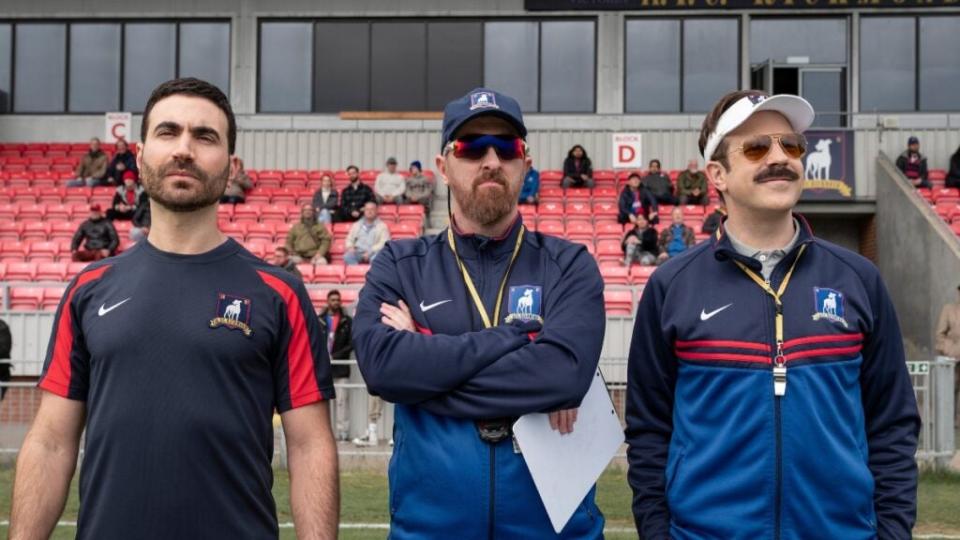What the Hollywood Strikes Are Costing the Studios
Ever since the WGA strike began in early May, there have been two questions haunting Hollywood: When will these strikes be over? And how much is this costing?
The answer to the first question will depend on negotiations between the WGA, SAG-AFTRA and the AMPTP. As for the financial toll, it’s already been estimated that California’s economy lost $3 billion due to the strikes. But now, thanks to the conclusion of earnings season, the studios and streamers have shed a bit of light on just how much the work stoppage is costing them.
Or rather, not costing them. In some cases, the companies are experiencing a short-term financial benefit, since they don’t have to lay out money for halted productions. In most cases, though, that’s spending that will shift from 2023 to 2024, so it’s more a matter of timing.
The biggest divide is between buyers and sellers of content. For studios that are primarily producing or commissioning movies and shows for their own distribution channels, the strikes have provided a short-term boost to cash flow, since they don’t have to lay out money for halted productions. That bill will come due after the strikes end and production resumes, so Wall Street is largely treating those savings as a wash. Suppliers like Sony and Lionsgate are feeling the pinch in lost revenue, since they don’t get paid for shows that aren’t getting made.
Not every company assigned an exact number to the strike’s impact. Massive tech companies like Apple and Amazon were able to skip over the issue altogether: At their scale, the cost of interrupted productions wouldn’t be material. But thanks to prodding from Wall Street analysts, six companies did assign a dollar value to the issue. These figures appeared in several different ways that are specified throughout this guide, such as adjustments in content spending budgets, increases in free cash flow and decreases in projected sales revenues.
In total, TheWrap identified nearly $5 billion in delayed or reduced spending or additional expenses that companies attributed to the ongoing WGA and SAG-AFTRA strikes. Disney, Netflix and Warner Bros. Discovery accounted for the bulk of that figure — not a surprise, given their large content budgets.
Here are the details on each company’s strike costs.

Disney
The head of the House of Mouse did not waste much time when it came to addressing the elephant in the room: Between the strikes and other cost-cutting moves, Disney will be saving $3 billion a year on what was a $30 billion annual content budget, CEO Bob Iger told analysts.
“We currently expect fiscal 2023 content spend to come in at approximately $27 billion, which is lower than we previously guided due to lower spend on produced content, in part due to the writers’ and actors’ strikes,” Iger said on the earnings call.
This $3 billion figure does not only reflect savings from the strikes. In February, Iger unveiled a companywide restructuring that led to mass layoffs as well as a $5.5 billion cut across nonsports content budgets.
Disney impact: $3 billion savings on content spending for the fiscal year

Lionsgate
In its most recent annual report, Lionsgate reported producing some 80 television shows for 35 different networks. That role as a Hollywood “arms dealer” meant it felt the pinch from the strikes: The mini-major reported an estimated impact of $30 million a quarter. Though that number was spread across several business units, the divisions most affected were 3 Arts, a talent management and production subsidiary, and TV operations.
“We have built in an assumption that the strike goes through the September quarter,” Lionsgate CFO James Barge said during the company’s call for the first quarter of its 2024 fiscal year. “If it goes longer, it’s a similar impact, probably, as it rolls quarter to quarter. If it does, we’re hopeful that things get resolved and we’re back to work in the mid-fall.”
Lionsgate impact: $30 million a quarter

Netflix
The company that’s perhaps most at the center of the ongoing WGA and SAG-AFTRA strikes didn’t shy away from addressing the financial impact during its earnings. From a financial perspective, the strikers are doing Netflix shareholders a favor, at least in the short term.
Previously, Netflix had given Wall Street guidance that its free cash flow for 2023 would be around $3.5 billion. However, due to production timing and the ongoing strikes, that number is now expected to be $5 billion, an improvement to the upside of $1.5 billion. In short, Netflix is saving money on canceled or postponed productions in 2023, though it might have to spend that money in 2024 as productions resume and Hollywood catches up from the strikes’ effects.
Though co-CEO Ted Sarandos dodged questions on the company’s second-quarter earnings call in July about about how long Netflix could run on content that’s already in the production pipeline before it feels the effects of the strikes, he did address the ongoing pickets.
“We very much hoped to reach an agreement by now,” Sarandos said before noting that he was raised “in a union household.” “We’re super committed to getting to an agreement as soon as possible, one that’s equitable and one that enables the industry and everybody in it to move forward into the future.”
Netflix impact: $1.5 billion improvement in free cash flow in 2023

Paramount Global
Paramount is a tricky one to analyze. Though CFO Naveen Chopra did attribute some improvement in the company’s free cash flow due to “continued delays in production due to the strikes,” and anticipated more cash savings through the remainder of 2023, he did not break down exactly how much of that figure had to do with the halting of work. Instead, he merely said it “included modest impact from the strikes.”
Paramount’s continuing operations used $210 million of cash in the quarter, Chopra said.
The company also said it would use Paramount+ content to fill out CBS’ programming slate in the interim.
Paramount impact: A “modest” amount of improvement to free cash flow

Sony
For the technology and entertainment giant, the strikes’ impact appeared in an adjusted 2023 forecast for its Pictures segment. In April, the sales forecast for this segment for the year was about $10.49 billion. But in the company’s second quarter, that projected forecast dropped to $10.14 billion, a negligible decrease of 3% or $34.5 million, reflecting Sony’s primary role as a supplier to other studios.
In the second quarter earnings report, Sony noted that the strikes are expected to lead to “release date changes for some theatrical releases” and “delays in deliveries of television series.”
Sony impact: $34.5 million decrease in projected sales revenue for 2023

Warner Bros. Discovery
In its second quarter earnings report, Warner Bros. Discovery credited its outperformance on free cash flow for the quarter to several reasons. Among them was “modest cash savings from the impact of the WGA and SAG-AFTRA strikes, which we estimate were in the low $100 million range during the quarter,” CFO Gunnar Wiedenfels said on the earnings call.
Wiedenfels also noted that company was projecting a return-to-work date for early September.
“If the strikes run through the end of the year, I would expect several $100 million of upside to our free cash flow guidance and some incremental downside for adjusted EBITDA.”
Warner Bros. Discovery impact: $100 million improvement in operating cash flow

The others
Not every company addressed the financial impact of the strikes. For some movie studios, it’s still too early to say what the cost will be. Other companies, such as Nexstar, pointed to programming pivots as an explanation for why the strikes haven’t presented much of an impact. Still, others in the tech sector are simply too big to waste shareholders’ attention on this relatively small matter.
Here’s how the rest of Hollywood addressed the strikes:
Comcast/NBCUniversal
Comcast did see a $200 million year over year increase in free cash flow to $3.4 billion for the second quarter of 2023. But the NBCUniversal parent, whose businesses range from cable and wireless service to theme parks, did not attribute a specific amount to strike-related savings.
After noting that Comcast is committed to ending the strikes, President Mike Cavanagh said that the financial toll of the strikes was “all manageable” and would merely “shift studio working capital out of the near term and into the future.”
“Obviously, the longer the strike, the more that could have an effect as you look into 2024 and beyond,” he added.
Apple and Amazon
Amazon and Apple share the same problem: They’re both such massive companies, their TV and film offerings are little more than a line item on their earnings reports. In their recent quarterly earnings calls, the WGA and SAG-AFTRA strikes weren’t discussed in any meaningful way.
AMC Entertainment
The theater chain didn’t spend much time on the strike. With the releases of “Barbie,” “Oppenheimer” and “Sound of Freedom,” CEO Adam Aron said the company’s third quarter was off to an “explosive start” and that these movies led to the company’s highest monthly revenue in its history for July.
“With the first half of the year now behind us, the 2023 domestic industry box office is 20% ahead of last year, and we believe the second half of the year could be even better unless the current writers’ and actors’ strikes wind up delaying the release of movie titles into next year,” Aron said.
AMC Networks
AMC is in a coveted position as far as TV networks are concerned. Because of its production schedule, its show slate has yet to be substantially impacted.
“In the short term, the reality for AMC Networks is that we have a pipeline of finished shows that will allow us to continue to serve our viewers across all of our platforms for the remainder of this year and well into 2024,” CEO Kristin Dolan said.
Cinemark
Because Cinemark depends on the schedules of film studios, the company was unable to give a straight answer about the impact of the strikes. That means no numbers from Cinemark.
“The evolution of these strikes is something we are watching closely, and their degree of impact on near-term film volume in box office will ultimately depend on how long negotiations progress,” Sean Gamble, president and CEO, said.
Fox Corporation
Aside from CFO Steven Silvester Tomsic acknowledging that the company’s content spend will likely be down next year “given the strike,” Fox also didn’t address the strikes in any major way.
“The entertainment business from a linear perspective probably holds steady if you normalize for the strike,” Tomsic said.
Imax
Because Imax productions for the rest of the year are either finished or “about to be finished,” CEO Richard Gelfond did not see the strikes presenting an immediate problem. Gelfond also noted that the company believes studios’ reluctance to give up agreed-upon Imax windows will make them think twice about pushing back theatrical runs and that “local language films” taking the place of any delayed Hollywood productions overseas could help the company in the second half of the year.
“None of this is really likely to be a 2023 issue. In terms of 2024, if the strike lasts a long time, it likely wouldn’t affect a lot of content in the first half of ’24,” Gelfond said. “It would more likely affect content in the second half of ’24.”
Nexstar
Nexstar and its channels are in an enviable place. Because NewsNation, the Food Network and the Cooking Channel rely on unscripted content and talk shows, its programming has yet to take a substantial hit. As for The CW, the broadcast network was already pivoting to include live sports, international acquisitions and unscripted content as part of its programming shift in the wake of its acquisition. No company on this list is strike-proof, but for a major TV player, Nexstar is pretty close.
Roku
The company did not comment on how the strikes would affect its programming lineup, though it’s leaning more into unscripted lately. CEO Anthony Wood did note that ad revenue from media and entertainment would be “further challenged” due to the strikes.
For all of TheWrap’s WGA strike coverage, click here.
The post What the Hollywood Strikes Are Costing the Studios appeared first on TheWrap.


